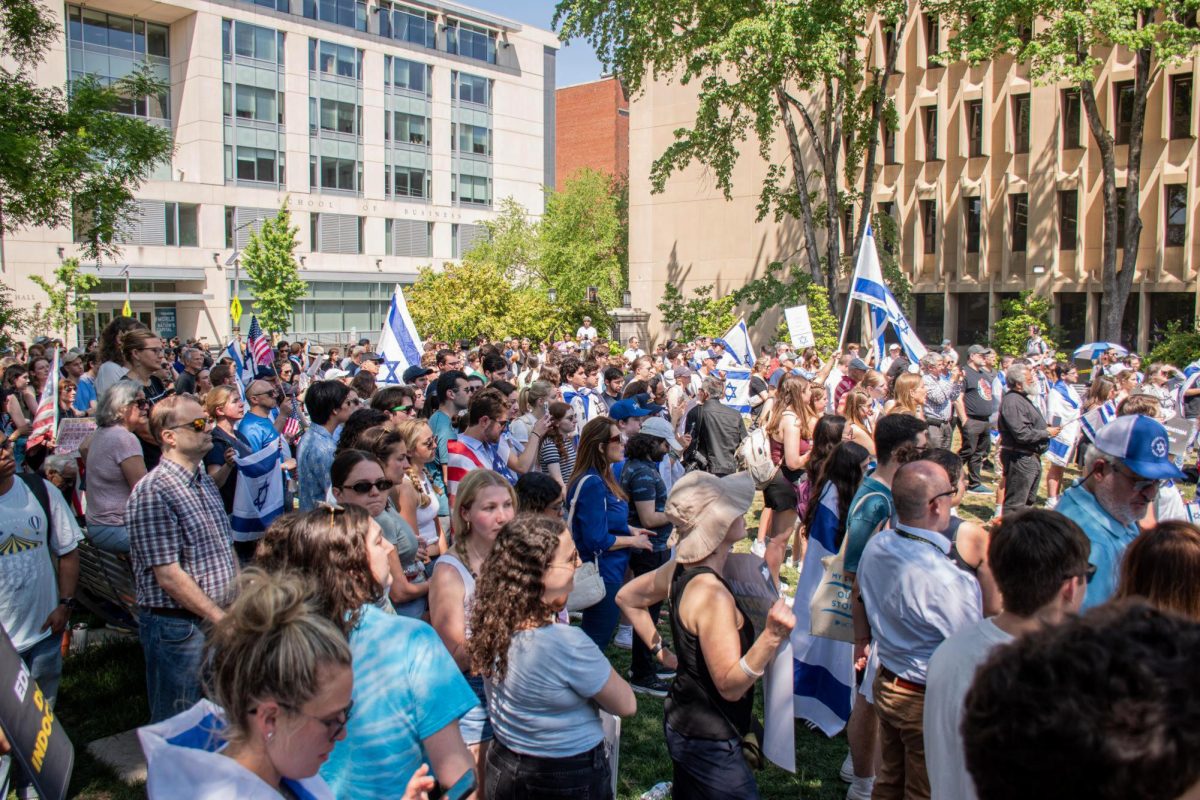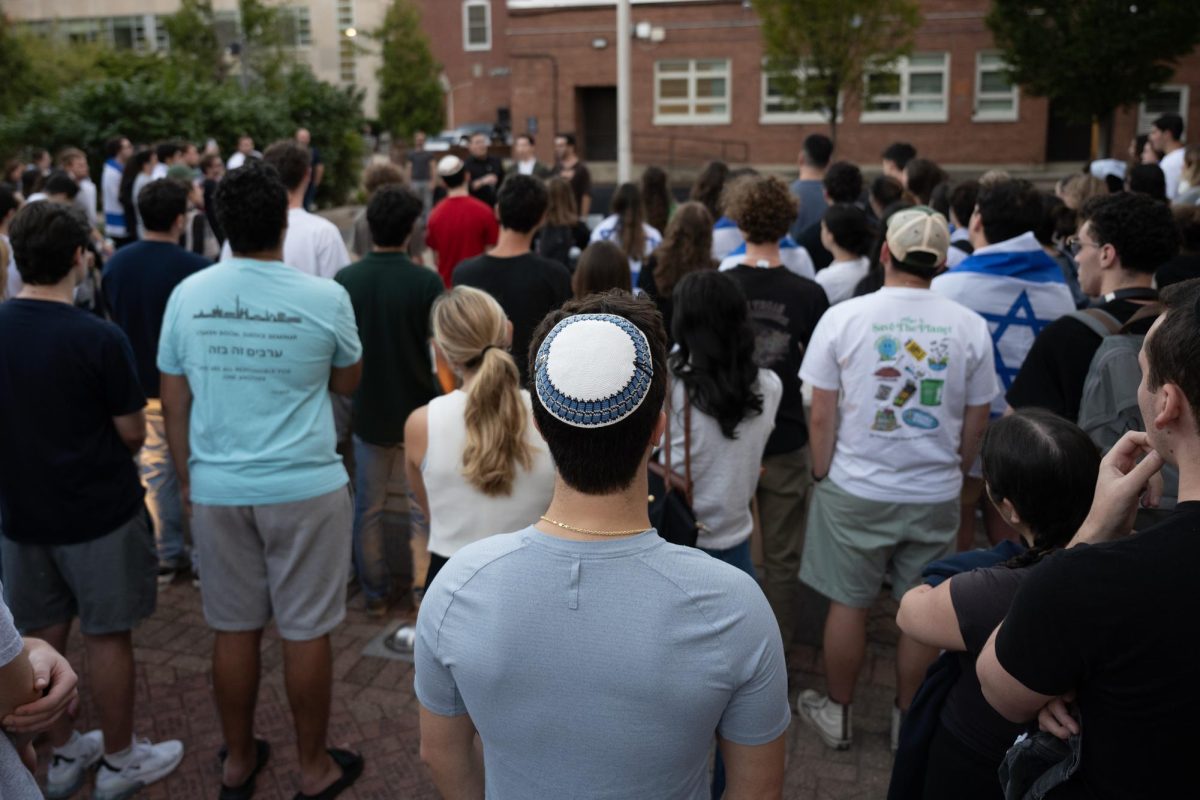One year after Hamas’ attack on Israel on Oct. 7, 2023, some Jewish community members said they have grown in their religious identities and connection to Israel as they navigate heightened antisemitism, advocacy for loved ones affected by the war in Gaza and personal grief.
Some students said they are increasingly aware of antisemitism and its manifestations in protests, social media and in their everyday lives after Hamas on Oct. 7 killed more than 1,200 Israelis and took more than 250 hostages, 97 of which are still missing. Amid rising antisemitism in the past year throughout the United States, Jewish students and leaders said some parts of GW’s Jewish community have grown closer in the last year through civic action like fundraising for Israeli emergency health services, emotional support for peers experiencing trauma and conversations about the events of the past year.
“I’m able to live out my daily life, I’m able to have fun and to be a normal college student — whatever you define normal as — live a typical college life,” junior Aidan Cullers, co-president of the Jewish Students Association, said. “But at the same time, there is always that feeling deep down that the world has changed and that the world that I grew up in prior to October 7 is not the world that is after October 7.”
Immediately following the Oct. 7 attacks, the Israeli government declared war with Hamas. More than 40,000 Palestinians have been killed in the Israeli military’s counteroffensive since the war in Gaza began.
Cullers, who is also a member of Alpha Epsilon Pi, a Jewish fraternity, said the organization coordinated a fundraising drive a week after the attacks and raised more than $7,500 for Magen David Adom, the national aid society of Israel.
“There were still bombs being dropped in Israel at this time, so we did what we felt like we could do,” Cullers said. “That’s something that kept me going, and I know it’s something that kept a lot of my brothers going as well.”
Cullers said after Oct. 7, he became aware of community members’ “precarious standing,” noticing that antisemitism appeared more prominent on campus, across the United States and on social media than community members had previously thought. Just under a third of hate crimes in the past year were motivated by anti-Jewish bias, the largest percentage of any bias that year, compared to 13 percent the year prior, according to the FBI’s Crime Data Explorer.
Cullers said he grew up in circles where there was positive conversation about being Jewish, adding that he previously believed antisemitism was a “dying form of hate.” He said the 2017 Unite the Right rally in Charlottesville, Virginia, the 2018 shooting in a Pittsburgh synagogue and now, the aftermath of Oct. 7, have all been events that brought a wave of antisemitism to the United States.
“Even if it is one person hundreds of miles away who holds those views, that still, unfortunately, can ruin someone’s day,” Cullers said.
Cullers said his life “certainly” changed as a leader after Oct. 7 when he leaned into fundraising and activism for Israel.
“I used to be kind of skeptical of wanting this mass donation campaign,” Cullers said. “‘Does it really work? Is it really that effective?’ But now, after the work that we did after October 7, I can firmly say yes, it’s important, and it really has an impact, and it means something.”
Cullers said he also assumed a more supportive role in his friendships after Oct. 7 by learning to support his peers experiencing grief. He said he knows people that have lost friends or acquaintances after Oct. 7 because of their beliefs about the war but was fortunate enough to not lose any of his own.
“I really had to help people through a very difficult situation, which is not something that I have particularly had to do,” Cullers said. “Help people in my life before dealing with legitimate trauma, helping friends who know people who live in Israel who were being bombed or they knew friends who had been bombed.”
Cullers said his friendships strengthened after Oct. 7 because Jewish student organizations supported one another as they processed the attacks.
“The Jewish community here at GW has always been very strong,” Cullers said. “I think that people are not afraid to express their Jewish background and their Jewish heritage, and I think we’ve still seen that since Oct. 7.”

Rabbi Yudi Steiner, the director of the Rohr Chabad Center at GW, said Chabad started hosting free, nightly family-style community dinners after Oct. 7, which provided a space for students and community members to mourn and voice their fears about friends and family in Israel.
Steiner said there is “nuance” among the Jewish community regarding the war in Gaza, but a “majority” of the community felt pro-Palestinian protests at GW and around the country that ensued after Oct. 7 were not in solidarity with the plight of Palestinians or government policy in Israel.
“It was protest against the right for Jewish people to be proud, to be connected, to support a homeland, and when every other nationality and ethnicity and country can be proud of who they are, but Jewish people can’t, many people felt that that was antisemitism,” he said.
Steiner said in conjunction with Mega Chanukah, which Chabad GW hosts annually, the organization started its first Mega Shabbat last year, something he had wanted to do years before but was more driven to do after Oct. 7. He said Chabad has invited Israeli Oct. 7 survivors to campus this month to help students process the traumatic event by hearing firsthand encounters of events that day.
Steiner said he is “cautiously optimistic” that people will recognize that “family will always be family” in the Jewish community.
“That’s, I think, a lesson a lot of Jews took out of this experience,” Steiner said. “I’m hopeful, from a bird’s eye view — 1,000 years of Jewish history perspective — that Jewish people continue to lean into our values and traditions, because that’s truly what has allowed us to overcome adversity for all these years.”
Junior David Delarosa, an international business student, said after Oct. 7, Jewish students have been encouraged to hide their religion by their friends and family who are concerned for their safety, adding that he has friends who were spat at, yelled at and shoved after displaying their Jewish religion by wearing a Star of David or eating matzah.
Delarosa said after Oct. 7 his religious beliefs deepened, which he relied on to protect those who are currently in active duty in Israel, including his friends who are currently in northern Lebanon. He said the attacks also changed his personal objectives for his college experience to incorporate more advocacy for the defense of the state of Israel into his life alongside his academic and career goals.
The Israeli military has been targeting Lebanon in the past month in its military campaign against Hezbollah.
Delarosa said he hopes the Jewish community can continue to build peace by learning about the Torah and Judaism, as well as maintaining more consistent dialogue between people who may disagree on the issue.
“When we stop talking, we start becoming violent,” Delarosa said. “We start antagonizing one another, and I think that that’s just wrong. It’s wrong and it’s dangerous. We need to continue to talk no matter what.”
Junior Celia Little, the former president of J Street U at GW — a student chapter of the national organization that advocates for a two-state solution to the Israel-Palestine conflict — said there’s a “wide range” of beliefs about Israel within the Jewish community, and people became more vocal about their views after Oct. 7, which sowed some divisions in the community.
Little said since Oct. 7, J Street U has created campaigns encouraging members to urge their representatives to advocate for a ceasefire and the release of the remaining hostages. She said the organization has also held dialogue and processing spaces for students to discuss their beliefs on campus, including an event Sunday for students to discuss “shared grief” and “confusion” ahead of the anniversary of Oct. 7.
Little said she hopes GW’s Jewish and University-wide community can hold more empathy for different viewpoints and beliefs, adding that she’s accepted this past year that some of her peers in J Street U don’t hold the same opinions.
“It’s been a really hard year, a lot of grief and confusion, so I do understand when people aren’t willing to have dialogue, because when you’re in so much pain sometimes it takes a lot to be empathetic and to hold all the tragedy that has happened in Israel and Palestine the past year,” Little said.
Senior Sabrina Soffer, a Judaic studies and philosophy and public affairs major and an opinion writer for The Hatchet, said the higher attendance she’s seen at Shabbat dinners on campus since Oct. 7 is a sign of how the Jewish community has become more unified.
“People are super spirited,” Soffer said. “They stay for longer. They’re more interested in Jewish learning and Jewish philosophy, which is great, and that’s something that I’ve always been interested in, per my major.”
Lea Wolf, the co-founder of the George Washington University Jewish Parents United Leading Students Empowerment — a coalition of parents, students and alumni dedicated to supporting Jewish students using “relevant news and information” about Jewish life and combating antisemitism — said the organization was created by a parent of a student in the immediate aftermath of Oct. 7 as a way for parents to express a “whirlwind” of emotions following the attacks.
Wolf said many friendships among Jewish students on campus have “dissolved” in the past year, with Zionism and differing political views acting as deciding factors in relationships.
“Some Jewish students were even told by their peers, ‘We do not talk to Zionists,’” Wolf said in an email. “In response to this hostility, many Jewish students strengthened their Jewish identity, have become more active in Jewish organizations and religious life and have deepened their understanding of Zionism (the right of the Jewish people to a Jewish state in their indigenous homeland).”
Brooke Forgette contributed reporting.





